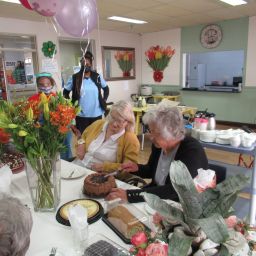September is World Alzheimer’s Month, a time to raise awareness about dementia and the care needs of those living with the condition. Every family faces difficult decisions when a loved one shows signs of cognitive decline, and one of the most challenging is knowing when it might be time to consider professional dementia care.
Dementia expert Debbie Beech, a trained social worker and former regional manager of Alzheimer’s South Africa who now works at the Rand Aid Association, explains that the signs of dementia often appear long before they are widely recognised. “You often hear stories of elderly individuals living independently who suddenly become unwell or hospitalised and are then diagnosed with dementia,” Beech says. “In reality, they were likely compensating in their familiar environment for some time, using lists and routines to maintain daily functioning. Once removed from that environment, the signs become obvious.”
Recognising the right time
Home-based care has clear advantages: The person living with dementia (PLWD) remains in familiar surroundings, can maintain their daily routine and often receives one-on-one attention from a private carer.
However, Beech cautions that there are limitations. “Private carers are rarely professionally trained, and there are no regulations governing their qualifications,” she notes. “Care needs become increasingly complex as the disease progresses. Pain, immobility or other issues can go unnoticed, not because of neglect, but because these needs often exceed the knowledge of family or lay carers.”
Caregiver burnout is another key factor. Caring for a PLWD requires constant attention to daily living tasks – bathing, dressing, feeding, administering medication – along with household responsibilities. “When the caregiver’s physical, emotional and mental resources are stretched to the limit, both the PLWD and the family suffer,” Beech explains.
The benefits of a care facility
Structured facilities provide a consistent routine, which is vital for someone living with dementia. “Routine provides a sense of security. When a person’s world becomes smaller, their anxiety and agitation can decrease in a facility where their needs are consistently met,” says Beech. Nutrition and medication adherence also improve, as meals and medication schedules are monitored by trained staff.
Early placement in a facility can make the transition easier. PLWD can form relationships with carers while still capable of understanding, allowing them to adjust more comfortably as the disease progresses.
Overcoming guilt and emotional challenges
Families often struggle with guilt, fearing they are failing their loved one by moving them into care. “It is emotionally taxing, especially for spouses,” Beech notes. “Families need to remember that placing a loved one in a professional facility is similar to taking someone seriously ill to hospital. It is about ensuring they receive the best care.”
Placement also allows family members to reclaim their role as spouse or child, spending quality time with their loved one without the constant worry of day-to-day care.
Practical steps for a smooth transition
Familiar items from home – a favourite chair, blanket, or photographs – can make the room feel personal. Avoid telling the PLWD they ‘need care’, as this can cause resistance. Instead, provide simple explanations about moving to a safe, structured environment, and be prepared to repeat the explanation consistently.
Supporting caregivers
Caregivers need emotional and practical support, particularly when family members disagree with the decision. Beech emphasises the importance of a strong support system, whether through family, friends or the social workers and staff at the care centre. “Admitting that your loved one’s needs exceed your abilities takes courage. Allowing professionals to take over is a sign of love, not failure.”
See for yourself
Beech advises visiting centres to see the activities offered and the standards of care firsthand. Modern facilities provide social, recreational and therapeutic activities, encouraging meaningful engagement and interaction. Ask pertinent questions, such as whether there are visiting hours and if family members are allowed to visit during the first two weeks to help their loved one settle in. This early support is vitally important; without it, the loved one may feel abandoned.
Maintaining meaningful connections
Paradoxically, family connections often improve after placement. Without the constant burden of caregiving, visits can focus on enjoyment and companionship. Many facilities offer cafés or shared spaces for families to spend quality time together.
SUPPORT GROUP FOR DEMENTIA CAREGIVERS
Caring for a loved one with dementia can be a challenging and isolating journey, but you don’t have to walk it alone.
A support group for caregivers and family members of people living with dementia has been running for around 14 years. It is facilitated by Lorna Quinn, who is a registered counsellor with the Health Professions Council of South Africa and has many years of experience in the field of dementia. The group is dedicated to supporting caregivers and family members of people living with dementia.
“We provide a safe and supportive space to receive information and share the various challenges that come with caring for a loved one. The way forward becomes less isolated and overwhelming as the group provides support in ways that draw from the collective contribution of all who attend,” explains Lorna.
The group meets on the second Saturday of each month at the Elphin Lodge clubhouse from 9:30am to 10:30am, and is followed by refreshments and informal connection time.
For more information, contact Lorna at 082 456 5692.
- Take part in our ‘I am more than my dementia’ Facebook campaign and share a story and/photo of your loved one: https://www.facebook.com/photo/?fbid=834707312212807&set=a.306194251730785
















